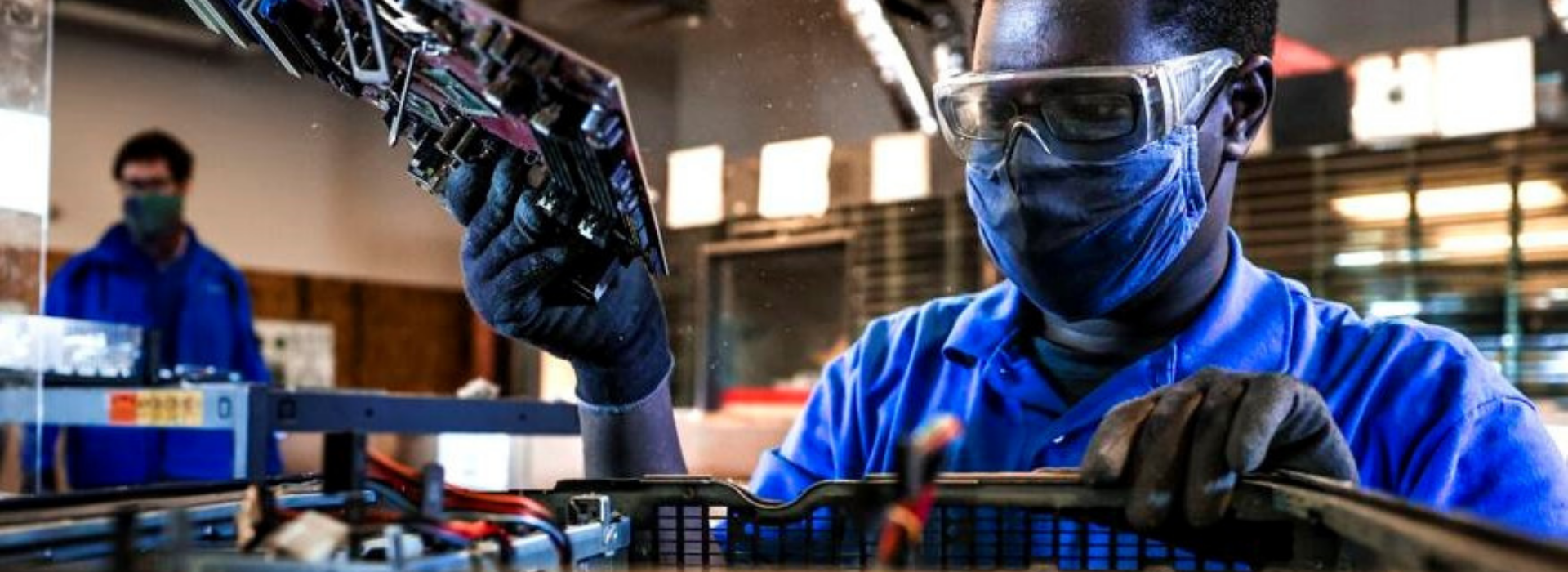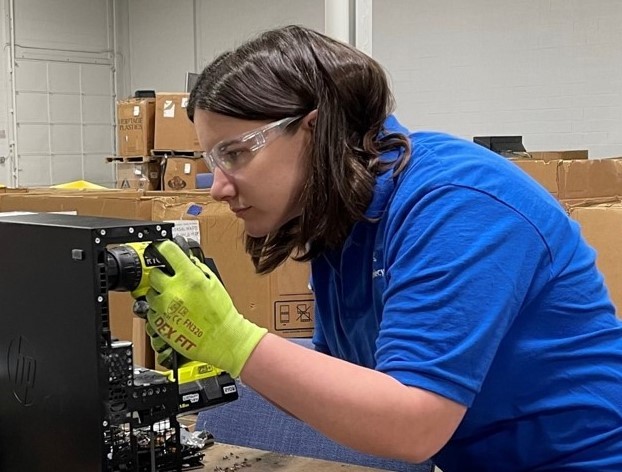This small business repurposes electronics waste — and gives people with autism more purpose
October 29, 2021 | By Sophie Hares
After decades working in telecom, Bill Morris was searching for a new corporate job in 2008. To see him through, he worked as a program manager at a Colorado Springs day program for people with autism and other developmental disabilities. One day, as he watched four men at the center gut a pile of old computers with surgical precision, he had a lightbulb moment.
“Everyone’s got junk in their businesses and garages that needs to be recycled. And then we’ve got people sitting at home who really need an opportunity to go to work,” says Morris, whose late brother had intellectual disabilities but was unemployed through most of his life. “We’ve got wasted talent and wasted resources.”
It was the kind of insight that altruistic entrepreneurs dream about but rarely experience. People with autism have valuable but untapped skills; by harnessing them, Morris could help recycle the growing mountain of electronic waste, provide a sense of purpose to an entire community — and build a viable business, too.
Just as he was wondering where to obtain financing, Morris ran into a couple who had been leasing a building to a company whose owner had skipped town, leaving behind a mountain of old electronics and a van emblazoned with “Blue Star Electronics.” Impressed with his idea, the couple wrote him a healthy check and handed him the keys to the empty facility and vehicle, which he swiftly changed to read “Blue Star Recyclers.”

Blue Star Recyclers, a 501(c)(3) social enterprise, now employs 46 people with autism and other disabilities and recycles around 10,500 tons of electronic waste each year at five sites in Colorado and Illinois. So far, it has trained almost 20 other U.S. recyclers to employ people with disabilities and expanded into Chile and the U.K. Morris and his son, Sam, the company president, this week earned one of four grand prizes from the Small Business Impact Awards, presented by Mastercard and Bank of America. These awards recognize small businesses that have made a big impact in their communities across four categories: innovation, diversity and inclusion, sustainability and giving back. Blue Star won in the sustainability category.
The Blue Star program is particularly relevant in the U.S., a country that recycles less than a quarter of its electronic waste and employs fewer than one in five disabled individuals, Morris says.
Influenced by stereotypes about disabled people, companies often ignore this largely untapped pool of reliable, talented and efficient workers, he says. At the same time, people with autism often struggle with traditional interviews, because they find it hard to make eye contact and converse. Instead, Blue Star lets candidates sit right down and start dismantling electronics to see where their skills lie. Job activities that encourage independence can reduce autism symptoms and increase daily skills, according to research by the Vanderbilt Kennedy Center.
Often highly engaged and productive, many people with autism enjoy the repetitive, detailed-oriented tasks involved in breaking up the many laptops, printers, cellphones and appliances that pour into Blue Star. They discover a sense of confidence, community and purpose at the organization, where disabled people can also work refurbishing computers, in logistics or in customer service, Morris says.
For instance, two of the four men who inspired the program no longer suffer from almost daily seizures, he says, and another one began talking for the first time after starting work. (Although his first utterance was a swear word, Morris recalls with a laugh.)
“On their first day, they don’t make eye contact, they don’t shake hands, they don’t talk to anyone, but when I come back two or three months later, they’re gabbing with their co-workers,” he says. “When you do something all day that you’re good at and you like doing, the self-esteem is just natural. A job really opens these folks up and you start to see who they really are, not their condition.”
CONTEST
Small business, big impact
The Small Business Impact Awards presented by Mastercard and Bank of America recognize small businesses across the U.S. that have made a significant impact in their communities across four categories: innovation, diversity and inclusion, sustainability, and giving back. Watch the award ceremony to learn more about the program and hear from the four winners.
The company recycles nearly 100% of the electronics, refurbishing some laptops for low-income students. It also strips and resells chips and aluminum and copper components and sends other parts off for reuse. An independent study showed that each Blue Star employee saves the taxpayer around $50,000 a year as they are earning an income instead of relying on government-funded programs and benefits.
Now father and son hope the Small Business Impact Awards win will raise awareness and prompt companies to look at ways they can employ more people with disabilities. The $10,000 prize money will go toward installing new CCTV cameras to meet data security requirements, and access to the Mastercard Digital Doors Toolkit will bolster the company’s digital presence and help Blue Star spread its model around the world, giving more people with disabilities the opportunity to live fuller, more productive lives, Sam Morris says. “Having a job, it turns out, maybe is the best medicine for a human being.”
Photos courtesy Blue Star Recycling